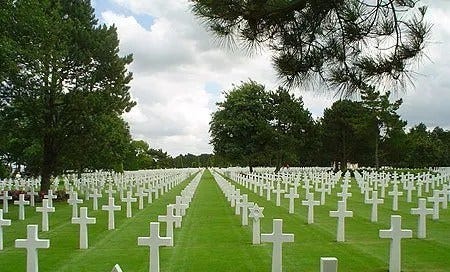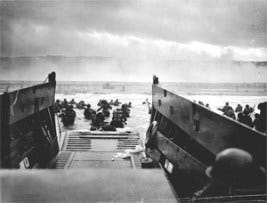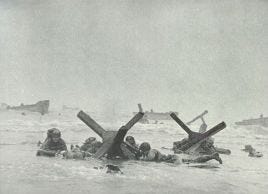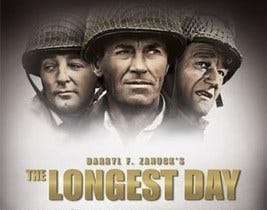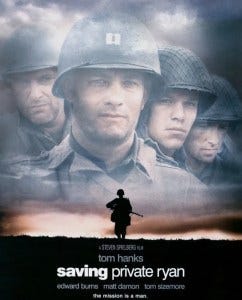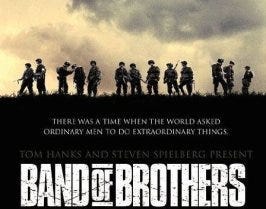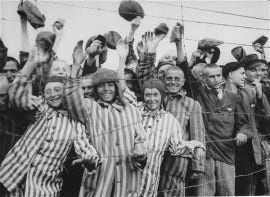HISTORY OF D-DAY
Why has D-Day captured the imagination of American consciousness for over three-quarters of a century?
Eighty-one years ago, on June 6, 1944, the Allies launched an offensive on the Normandy coast of France to liberate continental Europe from the Nazi German occupation. On Twitter/X, the hashtag is #DDay81
D-Day was the largest invasion by sea and air in history, literally turning the tide. It was the beginning of the end of the War.
General Eisenhower, Supreme Commander of Allied Forces, sent the troops out that day:
“You are about to embark upon the Great Crusade, toward which we have striven these many months. The eyes of the world are upon you. I have full confidence in your courage, devotion to duty, and skill in battle.”
Progress of D-Day Campaign
Within two months, the 77-day Normandy campaign led to the liberation of France and, in less than a year, to the defeat of the Nazi forces and the end of World War II in Europe. Between these two events, my father visited Paris while his US Army division was moving through France toward the Battle of the Bulge and the liberation of the Dachau concentration camp in Germany.
D-Day Landing
This amphibious invasion, described as a “never-surpassed masterpiece of planning,” was called Operation Neptune. It was part of the larger Operation Overlord, the continental lodgment that began with these Normandy landings. Shortly after midnight, the landing by sea was preceded by 24,000 paratroopers, including British, US, and Canadian airborne troops.
All in all, over 5,000 landing vessels and almost 160,000 Allied troops landed along a 50-mile stretch of French coastline to fight Nazi Germany on the beaches of Normandy. The attack was targeted in five different beach sections, codenamed:
Utah & Omaha (US)
Sword & Gold (British)
Juno (Canadian)
Ahead of the landing, Eisenhower told the troops:
“Your task will not be an easy one. Your enemy is well trained, well equipped and battle-hardened. He will fight savagely… I have full confidence in your courage, devotion to duty and skill in battle. We will accept nothing less than full Victory! Good Luck! And let us all beseech the blessing of Almighty God upon this great and noble undertaking.”
Omaha was renowned for the heavy casualties American troops suffered — over 2,000 — due to the tall cliffs with heavy German defense, limited Allied naval gun bombardment, and the low cloud cover that made aerial bombing difficult and ultimately too late to eliminate German beach defenses. While the Germans lost 1,000 men during the D-Day invasion, Allied casualties were much higher, with 12,000, including over a third confirmed dead.
Anticipation of D-Day
Adolf Hitler anticipated a western invasion by sea and directed his German forces to construct fortifications along the Atlantic coast from Norway down to Spain. Pas de Calais was the most expected landing point, being the shortest distance by sea from England, and was heavily defended.
German Field Marshall Rommel thought the Normandy coastline might be an attack point and constructed several concrete “pillbox” gun emplacements along the Atlantic coast. He involved other obstacles, including metal tripods, embedded wooden stakes, and anti-tank emplacements on the beach to slow down any amphibious assault craft and delay tank movement on the beach.
D-Day Remembered
D-Day has been commemorated in books, films, and television.
D-Day Books
Some of the best-known books include two by American author Stephen Ambrose’s D-Day June 6, 1944: The Climactic Battle of World War II and his Band of Brothers.
The fifth volume of Winston Churchill’s six-volume memoir “The Second World War” covers the War’s climax from the British perspective. Churchill’s sixth and final volume, Triumph and Tragedy, concludes the history with the Normandy invasion to surrendering the Japanese, ending WWII in the Pacific.
D-Day Movies
As a boy, I remember watching The Longest Day with my father as he pointed out technical errors the filmmakers had made, based on his knowledge of being there. There were also historical inaccuracies, but this was during the Cold War when historical accuracy seemed less critical than regaining American confidence by recalling the memory of a “just war” won with the assistance of our allies.
It was the first movie about the Normandy invasion, filmed in 1962, and starred a host of international stars, including Richard Burton, John Wayne, Henry Fonda, Robert Mitchum, and (a pre-James Bond) Sean Connery.
Half a century later, the best film of the current generation is the 1998 Spielberg/Hanks-produced drama Saving Private Ryan. The film depicts the landing at the Normandy beach as violent, frightening, and intense — too upsetting for some viewers.
Many years ago, while I was a student at Berkeley, I met on campus James Doohan, who played Scotty on Star Trek. He wrote a letter to Stephen Spielberg after seeing the film. He shared with Spielberg that he was an officer with the 3rd Canadian Infantry Division who landed on Juno Beach, after which he was hit six times by machine-gun fire and lost the middle finger of his right hand. He wanted to publicly thank him and say that the film’s depiction was utterly accurate, and commended him for not leaving out any gory details.
D-Day Television
The best television I’ve ever seen was the HBO miniseries based on Stephen Ambrose’s book Band of Brothers. Ambrose took his title from Shakespeare’s famous “St. Crispin’s Day Speech” in Henry V, Act IV, Scene 3, where King Henry of England says just before the Battle of Agincourt:
But we in it shall be remembered-
We few, we happy few, we band of brothers;
For he to-day that sheds his blood with me
Shall be my brother
The miniseries describes the movement of the 101st Airborne Division, E Company, through their jump training, initial landing at Normandy, and their exploits across Europe, where they intersected with my father’s 42nd “Rainbow” Division, E Company at Dachau in Episode 9 “Why We Fight.” This episode was introduced on HBO’s original website and featured my father’s story.
Personal Recollection
I recounted my father’s involvement in WWII here. He liberated the main Dachau camp — the first and longest-running concentration camp. It was the prototype and the training center for SS officers destined to work at other concentration camps. Its liberation took place just nine days before the end of the War. I wrote about the history of the Liberation in detail in a series of articles here.
I was in Paris over a decade ago during their weeks-long 70th commemoration of the city’s liberation following the battle of D-Day that ultimately led to the restoration of the French Republic. We have the French to thank for their help over two centuries ago in our own War of Independence — for their money, troops, and navy.
Every year since 2007, the French celebrate “D-Day Festival Normandy” with ceremonies, spectacles, and reenactments. This year, the festivities run from May 31 — June 15.
We had never seen, in one day, a naval invasion on the scale of D-Day. I hope we never shall again.
Reflection on D-Day
Today, the world pauses to remember the 4,400 Allied troops who were killed on that one day, including 2,501 Americans. The veterans visiting Normandy this week are from among the 73,000 US troops who originally took part in the D-Day landing. But the number of American casualties from D-Day until the Liberation of Paris in August of 1944 totalled 135,000.
The film Saving Private Ryan begins and ends with Ryan’s visit to the Normandy American Cemetery at Colleville-Sur-Mer, France. He recalls Captain Miller’s (Tom Hanks) dying words to him were, “Earn this.” As Ryan kneels at the cross on the grave of Captain Miller (Tom Hanks), he wonders aloud if he has lived a life sufficiently worthy to earn the sacrifice of the lives of six of Miller’s squad to return him safely home.
This is not the right question; it’s not the correct response to the blood spilled on his behalf. Instead, the proper response is to be grateful… the gratitude that viewers of the film are encouraged to have. This is echoed in the last words of the letter from General George C. Marshall (Harve Presnell) to Private Ryan’s mother eighty-one years ago, informing her that her only remaining son is returning home. In it, he shares with her “some words which have sustained me through long dark nights of peril, loss, and heartache” and then quotes from memory a letter written eighty years earlier:
“…I pray that our Heavenly Father may assuage the anguish of your bereavement, and leave you only the cherished memory of the loved and lost, and the solemn pride that must be yours to have laid so costly a sacrifice upon the altar of Freedom.
Yours, very sincerely and respectfully,”
–Abraham Lincoln.
Bill Petro, your friendly neighborhood historian
billpetro.com
Subscribe to have future articles delivered to your email.

